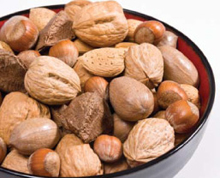Diet and Depression
 High-resolution version of this photo.
High-resolution version of this photo.Are you always down in the dumps? Do you feel dejected even when things are going your way? You may suffer from depression-but the culprit may not be your job or your love life. It could be your diet.
Nutrient imbalances can play tricks with the mind and lead to irritability, anger, stress, memory loss and depression, according to the Health Research Institute and Pfeiffer Treatment Center. Two key nutrients that are important in controlling these feelings are zinc and copper.
Zinc is a building block for more than 80 enzymes that directly affect brain activity. Copper, however, works differently. It helps to convert dopamine, a chemical produced by the body and used in brain function, into norepinephrine, which is associated with heightened alertness and mood elevation. The results of this conversion can be pleasant-but too much can lead to overstimulation, hyperactivity and depression.
This problem may be harder for women to control because estrogen, a female hormone, increases the body's absorption of copper. Several studies have focused on nutrient imbalances and their link to post-partum depression, as well to general depression in both men and women.
These studies typically use blood copper as an indicator of copper status, and elevated blood copper is interpreted to be an indication of an elevated "copper load" in the body. However, high levels of copper in blood are completely independent of the copper level in the body. Copper has often been implicated in certain pathologic conditions, including post-partum depression, based upon the incorrect assumption that the amount of copper in your blood indicates the amount of copper in your body. In fact, copper in your blood is a good indicator of an active immune defense.
For example, when you have a flu or cold, the level of copper in your blood will triple, although-on the whole-you have no more or no less copper in your body. Therefore, be cautious when you consider making a correlation between elevated levels of copper in your blood and elevated levels of copper in your body. The science many times tells us otherwise.
The best way to ensure proper nutrition and a healthy body is to maintain a balance of copper and zinc in your diet. Keep in mind that too much zinc inhibits the body's ability to absorb copper. According to the National Academy of Sciences, a proper daily balance for adults is: copper, 0.9 mg (male and female); and zinc, 11 mg (males), 8mg (females). Cu
Resources:
Also in this Issue:
- New Copper Solar Cells Promise a Bright Future
- Ivy-covered Walls, Copper Roofs Help Keep Tradition Alive
- A 21st Century Coppersmith
- Diet and Depression
